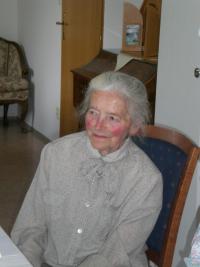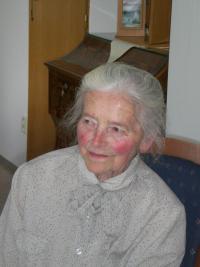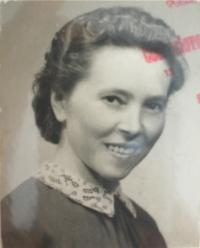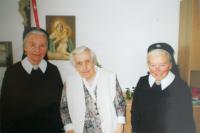"That was on the 7th of March 1957, they came for me in the factory, I had the morning shift: 'Take all your things and come to the office.' I stopped the machine and thought to myself: 'I have to have a look at the courtyard.' I saw a car. We were expecting it to come sooner or later, because they were following us, we kind of saw that, but we were young and we more or less made fun of it. For us, it was an adventure of sorts. For instance... when there was someone walking behind us, we said to each other: 'You go right and I'll go left, and now, what will he do?' He stood fidgeting, he didn't know which of us to follow. Basically we really just made... we thought to ourselves: 'What can they do to us, when we're not doing anything?' Well, but on that 7th of March, I mean February (she was arrested 7th Feb 1957 - ed.) they took us away, two of us from Hrádek... Sister Jana and me, and Sister Věra from Hradec. So there were three of us in Hradec. Prague came to us afterwards. 'You were in April.' (talking to Sister Milena) They took another four, so seven of us all in all from our group. Well, and we didn't know why they took us. We asked them, they said: 'You'll see, you'll see!' They searched our rooms, rifled the place through and through. Then they said I could tidy it up, we had bits of cloth there and suchlike. I told them: 'If I'm staying here, I'll tidy it up, and if you're taking me with you, then you can tidy it yourselves.' Well, and they took us to Hradec. Then the changing into prison clothes, they take everything from you. They put you in this cell, it took me a moment to get a bearing, I knelt and wanted to offer the time I spent there, to give my life anew, but they were there already to take me to interrogation. That was always a clatter of keys. Well, and so one had to go along the corridor, arms tucked nicely behind the back, it took them till they taught me that... And then it was teeming with them. I sat on a plank by the wall, something like a clapper it was. And now... I had read a book before about how it was when the Germans took prisoners. What they used to decide. So I thought to myself: 'Well, they'll beat me, which side will I get it from first?' So I looked at them, flying around me, each with papers: 'What is it? What is it? What is it?' But I didn't sense them in that way, I just kept telling myself: 'So where is it going to come from?' Then the 'Stokerman', the man who led the interrogation, and he shouted at me: 'Should I get you a psychiatrist?' And that helped me! I came to and said: 'Thank you, but it's not necessary, I'm calmer than you are!' And that was the end of the first interrogation. Well, but then it was... one after the other. And they always wanted us to, like: 'How come I see you in such clothing?' I replied: 'It's not my taste, it's the Ministry of Interior's taste.' I always thought that was... I was strengthened a lot by the fact that our founder was also in prison in Dachau and he told of how he had managed there, what gave him strength. I said that he had told himself that God always gives his child the best nappy, even if it contains some thorns and thistles, it's the best to make him prosper and grow, so he needn't be afraid of anything. So we had this conviction and we were proud of being the only sisters of our worldwide community to be imprisoned. We considered it an honour of sorts, to share a part of the fate of our founder. That kept us going and gave us a certain joy and strength."




